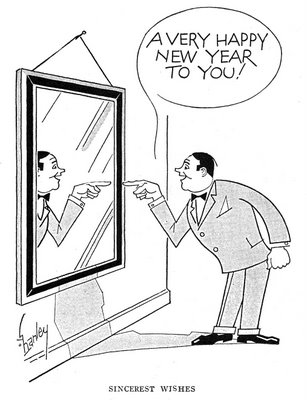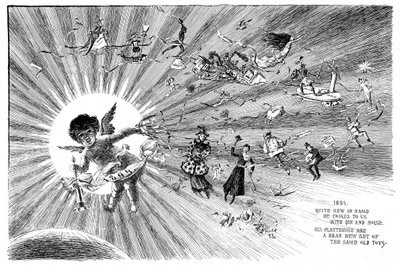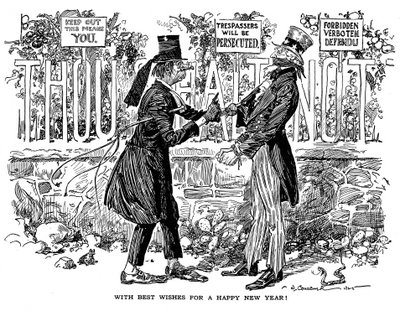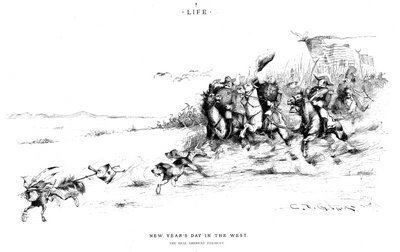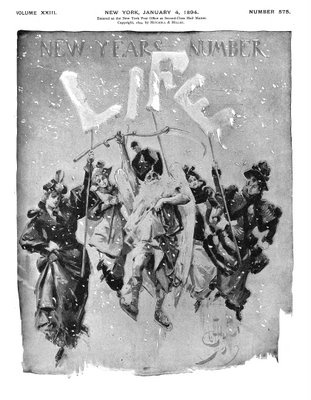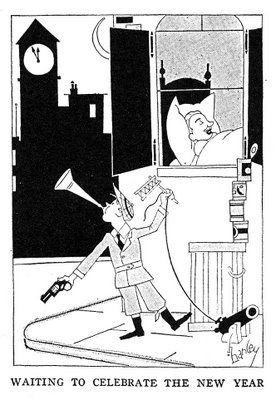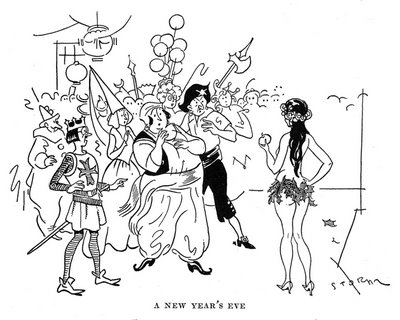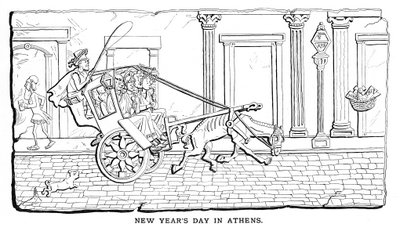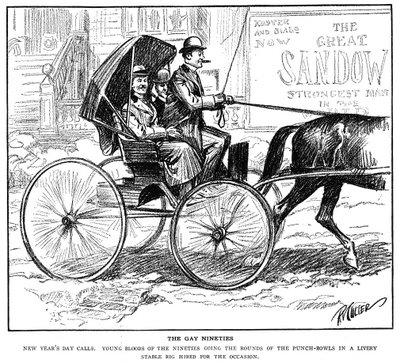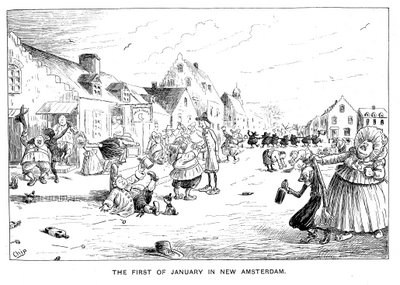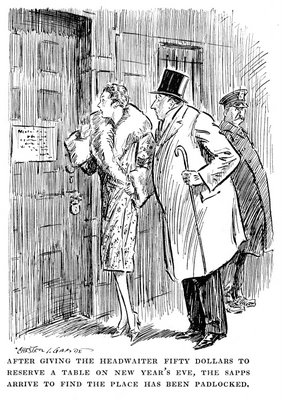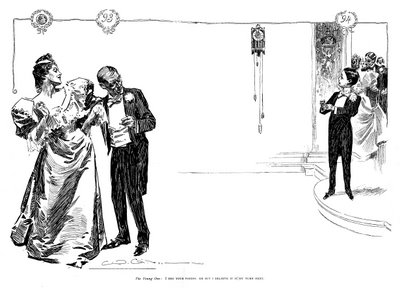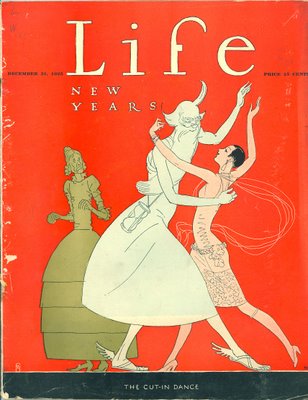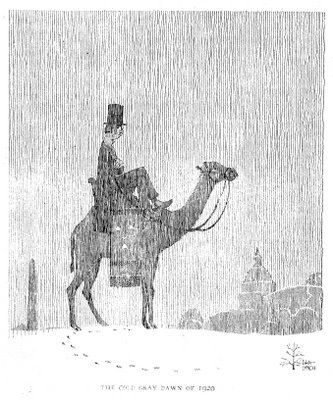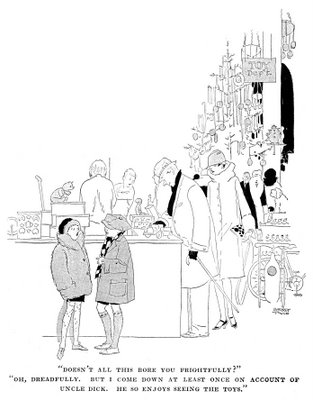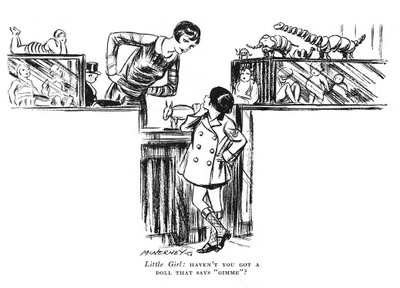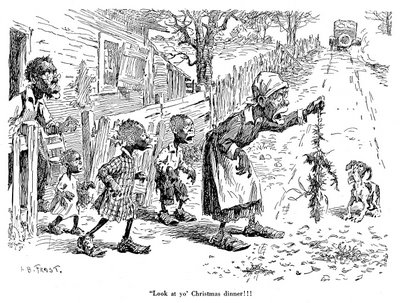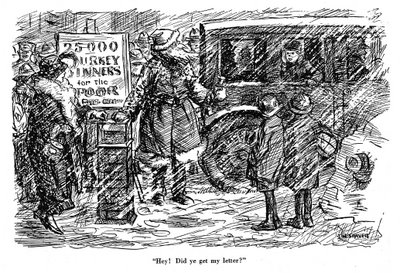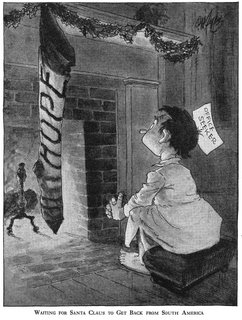 Gardner Rea, December 14, 1922
Gardner Rea, December 14, 1922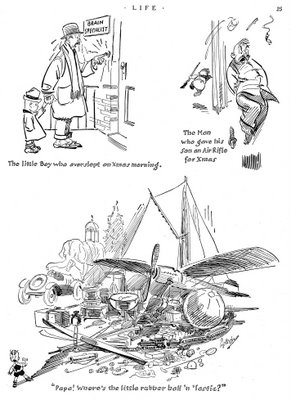
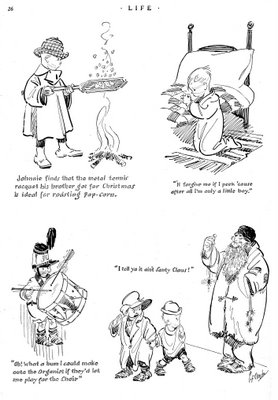
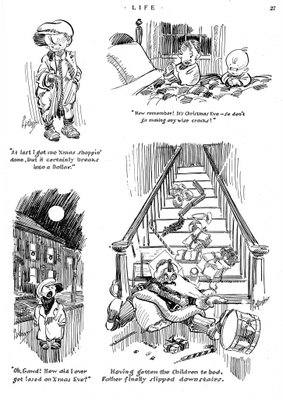 Percy Crosby, December 7, 1922
Percy Crosby, December 7, 1922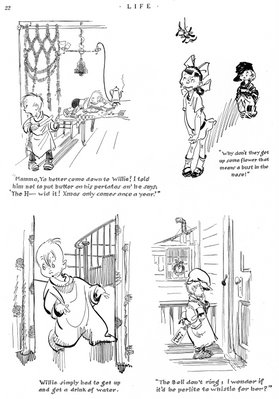 Percy Crosby, December 21, 1922
Percy Crosby, December 21, 1922 T. S. Sullivant, December 7, 1922
T. S. Sullivant, December 7, 1922 J. Norman Lynd, December 2, 1926
J. Norman Lynd, December 2, 1926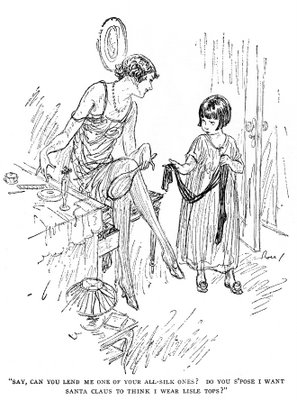 Roes(?), December 17, 1925
Roes(?), December 17, 1925 T. S. Tousey, December 17, 1925
T. S. Tousey, December 17, 1925 Gluyas Williams, December 7, 1922
Gluyas Williams, December 7, 1922 Christmas with the "Vicious Circle"
From the December 21, 1922 issue of
Life, a pair of Christmas themed doo-dads by Robert Benchley and Dorothy Parker.

STEPHEN is two and a half, and has certain very definite reasons for wanting to complete the process of slipping an old iron washer over the stem of a broken Ingersoll. He has been working on it in his crib since five o'clock in the morning, and here it is barely six-thirty when the Head of the House comes in, dressed very unbecomingly in bath robe and slippers, and says, with forced gaiety:
"Well now, sir, how about going downstairs and seeing what Santa has brought?"
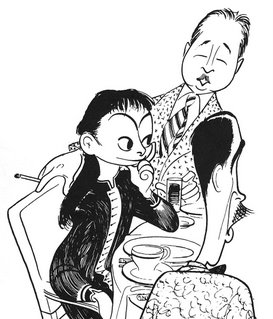 |
| Detail from Algonquin Round Table by Al Hirschfeld, showing Dorothy Parker, Robert Benchley and Life editor Robert E. Sherwood . From Hirschfeld On Line, Applause Books. |
There has been a lot of talk about this "Santa" for several weeks past, none of it particularly interesting. It seems that he comes down the chimney or something, obviously a falsehood. And even if he does, what
of it ?
However, the Head of the House and his Wife appear to derive a great deal of innocent merriment out of talking about the event; so it is best to humor them and simulate an interest.
This is a bit too thick, though, to be dragged away from important work with the iron washer and taken down stairs on a purely speculative hunt after what this "Santa" may or may not have brought. It has been emphasized in the preliminary conversations on the subject that this "jolly old soul" reserves considerable leeway to himself in the question of whether or not certain boys are to receive any presents at all, the whole thing being contingent on whether or not they have been what is technically known as "good boys" during the two weeks previous. A glance back at Stephen's behavior during the past two weeks convinces him that his chances are hardly worth while getting out of bed to go downstairs for.
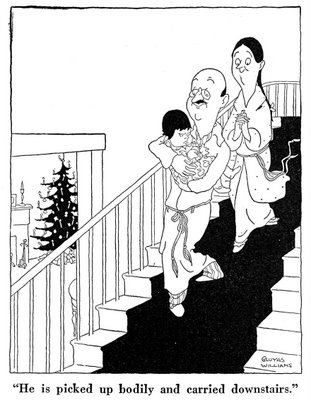
There is no other way, however, as he is picked up bodily (a cowardly thing for a great big bully like the Head of the House to do, simply because he has the size) and carried downstairs to where a large, brilliantly lighted tree is standing by the fire-place. A tree in the house is ridiculous in the first place, but there is unquestionably something nice about those lights. Do you suppose that by squeezing one of them the color could be made to ooze out into the hand, and from there be transferred to the face, like marmalade or paints ? Well, there is no way to find out like trying, so here goes.
"No, no, Stephen! Mustn't touch lights!" (Why will these people insist on leaving out definite articles when talking to anyone ten years younger than they are ? Do they think it makes it any easier to understand them? They just make fools of themselves, that's all.) "Here, see this dreat big booful doggie that Santa broaght Stephenl" (Sickening, isn't it?)
The "dreat big booful doggie" turns out to be a flat failure. It is too big, to begin with. Then, too, there is nothing about it with a hole in it, like that washer (by the way, where is that washer?) which can be slipped over the stem of the Ingersoll. In this world, everything stands or falls by its ability to be slipped over the stem of the Ingersoll.
Then the Head of the House drags out a sort of mechanical banjo-player which you wind up and watch jump. The Head of the House thinks it is great. He winds it up and then says, "Look at that, will you, Doris!" Stephen tries to have a go at it, but it appears that it must be wound up by some older person. And if you can't wind a thing up yourself, what is the sense in fooling with it at all ?
"Well, I guess Santa Claus was pretty good to you," says a neighbor who has come in to see Stephen with his toys. "I just love to watch their faces when they see all the new things," she says. Anyone watching Stephen's face, however, would detect nothing more inspiriting than a slight expression of disgust at the Head of the House making such a show of himself over the mechanical banjo-player.
This goes on for some time, a line of grown-ups stepping up and waving some new inanity in Stephcn's face and saying, "Oh look, 'Teven!" (Another one calling him "'Teven" is going to get a good swift bust in the face) and then retiring to play with it themselves.
There are two things left in the world that Stephen wants to do. One is to try pinching those lights. And the other is to finish slipping the old iron
washer over the stem of the Ingersoll. The lights are outof the question now, but not the washer. All you have to do is crawl very quietly up the
stairs and down the hall (the mechanical toys are making so much noise that no one will notice you) and there, on the floor, is the best little toy that God ever made. That, man, is a toy!
And now to get down to work with it. After all, Christmas was meant for the grown-ups. The rest of us have things to do.
R. C. B.The Christmas Dinner
A Playlet of the Annual Family ReunionTHE scene is the dining-room in the apartment of Mr. and Mrs. Wrench. It was never planned with a view to banquets, but you have to have all the f amily to dinner some time, and Christmas is as good a day as any to get it over with. The dining-room chairs have been made to go around as far as they can, and the gaps have been filled in with a gilt chair from the parlor, a practically mahogany rocker from the bedroom, and an ingenious
affair, usually kept in the pantry, which can be folded into a chair if there is absolutely no other way to get around it, but which feels
far more like itself in its intended capacity as a short step-ladder. A small, indistinct uncle from Little Falls occupies a piano bench, set at a slant against one corner of the table.
The characters are: MR. WRENCH
MRS. WRENCH
AUNT BERTHA,
who is reputed to be able to sign her cheque for ten thousand dollars, and never even miss it.COUSIN JOSIE,
who teaches china painting.UNCLE FRANK,
in the linoleum business.AUNT CARRIE,
who has tried all the doctors.LITTLE LUCY,
their daughter, whose teeth are expected to straighten out nicely by the time she is eighteen.COUSIN CHARLIE,
who has never seemed to get along very well, somehow.COUSIN ADA,
who has heard that the New York women smoke in public.
The small, indistinct uncle from Little Falls.
They are all in action at the table when the scene opens.MR. WRENCH: Come on, now, Aunt Carrie, how about a little more ? Here's a nice little piece looks to me as if it had your name written on it.
MRS. WRENCH: Yes,
please do, Aunt Carrie.
AUNT CARRIE: Mercy, no, I couldn't get it down. I never was a great hand for turkey—I always say to Frank when we go out to dinner, "Now don't go spending a lot of money ordering turkey and stuff, because I don't care a thing about it." I don't know when I've had a piece of turkey before to-day—I suppose I'll suffer for eating this, later on. Dr. Massey says it's one of the worst things you can put in your—
AUNT BERTHA: Yes, a sad, sad time. Every year I say, "Oh, dear, I just dread the holiday season, it's such a sad, sad time." Your poor dear Uncle George came down with lumbago—at least, that's what we thought it was then — just twelve years ago two days before Christmas, and there was poor Allie's boy that broke through the ice with his new Christmas skates on, and dear old Dr. Nurnley took that last cold of his preaching his New Year's sermon. Yes, a sad, lonely time for all of us—
MR. WRENCH: Come on, now, Ada, how about a little more? Here's a nice little piece looks to me as if it had your name—
MRS. WRENCH: Yes,
please do, Ada.
COUSIN ADA: My, no, I couldn't touch it. It just seems to me as if you New York people do nothing but eat, eat, eat all day long. I should think you'd all be in your graves long before—
UNCLE FRANK: Now you take conditions December three years ago. Well, sir, I was talking to this fellow Ed Speare, runs this big oilcloth mill, a pretty fine fellow, too, and I said, "No, sir," I said "you can't tell me things will pick up, not in five years nor ten years from to-day. And what's more, Mr. Speare," I said—
COUSIN CHARLIE: Well, you were just about right there, all right.
COUSIN JOSIE
(smiling roguishly at little Lucy): Seems to me somebody's lost her tongue.
(Lucy promptly disproves this statement.) My, my, I guess if Santa Claus sees somebody doing a thing like that, he won't be so good to somebody when next Christmas comes around!
(Little Lucy flings herself from one side of her chair to the other.) MR. WRENCH: Come on now, Josie, here's a little piece look's—
MRS. WRENCH: Yes,
please do, Josie.
AUNT BERTHA: Yes, it s nice to be together at Christmas while we're all still here. I remember just as well that Christmas dinner we had at poor Edith's. We little thought that before the next holidays came round, poor Annie wouldn't be with us any more, although—it was the funniest thing—I always had a feeling that the poor child would never—
COUSIN CHARLIE: You dont say so! Well, that's a funny thing.
AUNT CARRIE: Lucy! No ice cream, remember, until you eat up every bit of those potatoes.
(Little Lucy flings herself more vigorously about in her chair, muttering incoherently.)COUSIN ADA: No wonder the poor child's nervous, cooped up in this little apartment since this morning. My, how you New York people live in these stuffy little boxes I simply can't understand!
AUNT BERTHA: Yes, a hard, hard Christmas this will be for poor Kitty. I know they say it's only whooping-cough, but Junior has always looked to me as if his lungs weren't any too strong. Well, we all have to go sometime.
COUSIN CHARLIE: Yes, that's right, that is.
MR. WRENCH: Come on, now, Aunt Bertha, here's a little—
MRS. WRENCH: Yes,
please do, Aunt Bertha.
(The revelries continue at this pace until darkness sets in.)
D.P.

